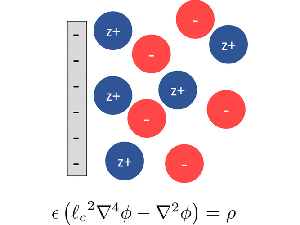Continuum Theory of Electrostatic Correlations at Charged Surfaces
 J. Phys. Chem. C 2020, 124, 21, 11414–11421
J. Phys. Chem. C 2020, 124, 21, 11414–11421
The abstract reads as follows: The standard model for diffuse charge phenomena in colloid science, electrokinetics, and biology is the Poisson−Boltzmann mean-field theory, which breaks down for multivalent ions and large surface charge densities because of electrostatic correlations. In this paper, we formulate a predictive continuum theory of correlated electrolytes based on two extensions of the Bazant−Storey−Kornyshev (BSK) framework: (i) a physical boundary condition enforcing continuity of the Maxwell stress at a charged interface, which upholds the contact theorem for dilute primitivemodel electrolytes, and (ii) scaling relationships for the correlation length, for a one- component plasma at a charged plane and around a cylinder, as well as a dilute z:1 electrolyte screening a planar surface. In these cases, the theory accurately reproduces Monte Carlo simulation results from weak to strong coupling, and extensions are possible for more complex models of electrolytes and ionic liquids.
This work was supported by an Amar G. Bose Research Grant (electrolyte calculations) and the Center for Enhanced Nanofluid Transport an Energy Frontier Research Center funded by the U.S. Department of Energy, Office of Science, Basic Energy Sciences under award no. DE-SC0019112 (onecomponent plasma calculations). J.P.d.S. is also supported by the National Science Foundation Graduate Research Fellowship under grant no. 1122374. J.P.d.S. would like to acknowledge useful discussions with Michael McEldrew, Amir Levy, Tingtao Zhou, Dimitrios Fraggedakis, and Mohammad Mirzadeh.
